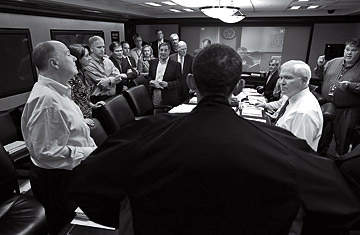
Mission Accomplished. Obama and his team after watching the strike unfold on a live feed from Pakistan.
(7 of 7)
Lessons
First, this case demonstrates that the U.S. government is capable of extraordinary performance in extraordinary circumstances. The challenge is to find ways to apply lessons learned here to improve performance in ordinary cases.
Second, sometimes secrets matter. And when they do, secrecy matters more. The bin Laden case demonstrates why success requires both discovering secrets and then keeping them, allowing a President time to reflect in private and permitting him to reach a decision and act. As Donilon likes to say, "There is only one way in Washington to keep a secret: don't tell anybody."
Third, secrecy comes with a price. Tightening the decision loop in order to prevent leaks means that important angles may not be adequately considered. If Mullen and Lute had been brought in earlier and told to design an alternative story line about Pakistani cooperation in the raid, that might have avoided humiliating the Pakistani military in its own backyard. As it happened instead, there can be no doubt about what Kayani and his army colleagues concluded from this experience. If the U.S. is able and willing to swoop into their country unannounced and take out bin Laden, could a future raid seize their nuclear weapons? (It is a little-known fact that Abbottabad is also a Pakistani nuclear-weapons site.) Going forward, whatever American officials say or do, Pakistanis will presume the worst about the U.S.'s intentions. The consequences of this for our prospects of not only finding an acceptable exit from Afghanistan but also securing Pakistan's nuclear arsenal are becoming clearer every day.
Fourth, the most troubling lesson from this case is the dog that hasn't barked. In the aftermath of Abbottabad, we are left with two possibilities: either the Pakistanis knew that bin Laden was there, or they didn't. If Pakistan's military and intelligence leadership was complicit in harboring OBL, we know now where we stand with our nominal ally. Like that of a couple in which the wife has found her husband in bed with a lover and exposed the infidelity publicly, this relationship will not soon recover.
But after intense review of the materials seized in the raid, the brute fact is that not a shred of evidence has been found to suggest anyone in the Pakistani military and intelligence hierarchy knew of bin Laden's whereabouts. Thus we are forced to consider the even grimmer possibility that Pakistan's military and intelligence leadership did not know that the U.S.'s most wanted man was living in their country. Could it be possible that a nation that is unaware that bin Laden lived within its borders for six years, moved five times with three wives and fathered four children (two born in local hospitals) is also a nation that is in control of some 100 nuclear bombs? That seems unlikely — but the evidence so far suggests exactly that.
The Obama Administration's attention is now fixed on the possibility that in the coming year, Iran will produce enough highly enriched uranium for its first bomb. But during these same 12 months, Pakistan will have produced enough material for at least 12 more nuclear weapons.
So as we applaud extraordinary performance in this operation — from the low-level intelligence collectors and helicopter-maintenance technicians to the SEALs and an NSC process that supported a focused, determined Commander in Chief — we are left contemplating a discovery that means we are likely to soon face even more daunting challenges in the days and months ahead.
